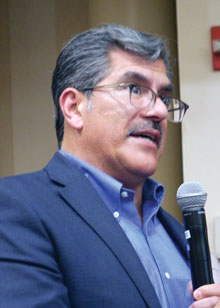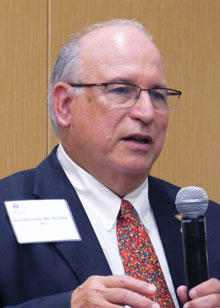We are not going to expand access to mental health care by providing poorer care,” APA Trustee Kenneth Certa, M.D., said of efforts by the Pennsylvania District Branch to expand psychiatry residency positions as an alternative to psychologist prescribing.
Speaking at APA’s 2024 State Advocacy Conference in September, Certa in his comments crystalized APA and District Branches’ (DBs) response to state efforts to grant prescribing privileges to non-physicians: There are better, safer ways to increase access to psychiatric care.
That includes not just expanding residency positions but also promoting the collaborative care model, which was the subject of its own panel at the State Advocacy Conference.
Collaborative Care in Louisiana
“Promotion of the collaborative care model has been very successful in opposing psychologist prescribing legislation by offering an evidence-based alternative to safely increase access to care,” said Amanda Blecha, Esq., APA senior regional director of state government affairs for the central region, who moderated the collaborative care panel.
Jean Bing Simpson, M.D., J.D., clinical assistant professor of psychiatry at Louisiana State University Health New Orleans School of Medicine, described the successful effort to secure payment for collaborative care—first for commercial insurers, followed by the ongoing effort to get reimbursement from Louisiana’s Medicaid program. It has been a story of “people, persistence, and patience,” Simpson said.
“Louisiana’s efforts to secure legislation requiring reimbursement of collaborative care begins with people and started in the 2022 state legislative session,” she said. “Our first crucial step was to secure a lobbyist whose excellent legislative contacts and personal relationship with a state representative who happened to sit on the health and welfare committee allowed us to approach that representative to sponsor our bill.
L. Lee Tynes, M.D., Ph.D., chair of the APA Council on Government Relations and professor of psychiatry at Tulane University, testified before the state legislature guided by materials provided by APA’s government relations staff. “We may have been naively ambitious, because our original bill required coverage by both commercial insurers and Medicaid,” Simpson said. That bill was approved by the state’s House of Representatives but in the Senate was “carved up like a Thanksgiving turkey,” she said.
Because Medicaid funding would impact the state budget, the bill would have needed a fiscal note attached to it. To render the bill budget neutral, the Senate only approved the model for commercial insurers.
In 2023, the Louisiana DB tried again, this time crafting a bill only for Medicaid. It was approved by the House Insurance Committee with a fiscal note attached—but only after the state budget had already been submitted to the Senate Finance Committee. Ultimately, the bill died in session.
Simpson said that next year the District Branch is planning to lobby Medicaid providers—there are six of them in the state—to voluntarily reimburse the model; two have already committed to doing so. “If that works in our favor, pursuing another bill may not be necessary because the model would already be paid for,” she said.
“What struck us the most was that much of the conversation was about the value of collaborative care,” Simpson said. “How does this help? What we found useful was being able to refer to good data that shows collaborative care is effective and that it can increase access to mental health. We relied on APA to provide a lot of this information.”
Tynes agreed, telling Psychiatric News: “Most of the interest from the legislators focused on the clinical description of collaborative care and the data supporting its efficacy. Having a physician there to testify, particularly one with firsthand knowledge of collaborative care, was critically important.”
Growing Residency Slots in TX and PA
The conference panel on state expansion of residency training positions featured Certa, an associate professor of psychiatry and human behavior at Thomas Jefferson University Sidney Kimmel Medical College, and Joseph Penn, M.D., a correctional and forensic psychiatrist who is a clinical professor of psychiatry at the University of Texas Medical Branch (UTMB), Galveston, and director of mental health services for UTMB Correctional Managed Care.
“I work in correctional settings, where it’s increasingly difficult to attract physicians, and in particular psychiatrists,” Penn told attendees. “We often rely on costly locum tenens psychiatrists to work in our jails, prisons, and juvenile correctional systems. The Texas Society of Psychiatric Physicians was extremely supportive and timely, and helped us emphasize to our legislature the pressing need for additional forensic psychiatric fellowship positions in our large state—we need more residency slots.”
The state approved $5 million for the next two-year cycle, increasing forensic psychiatry fellowship positions for Baylor College of Medicine and UT Southwestern in Dallas. “A few other Texas medical school systems are also seeking [accreditation] for new forensic psychiatry fellowship programs,” Penn said.
“You need dedicated forensic psychiatry faculty, varied opportunities for civil and criminal forensic evaluations, and other teaching and supervision resources [for the training],” Penn said. “It’s a work in progress. The state will be looking for return on investment. They will look to see the outcomes of this initial funding. I anticipate that this won’t be an open checkbook until they see metrics—they want to know how many of these trainees will stay and work in Texas, and where.”
Certa said the Pennsylvania DB is pursuing legislation to increase psychiatry residency positions that is modeled on a bill approved in neighboring New Jersey. “You have to explain the whole process of medical education to legislators,” he said, “but that is helpful because they get to know exactly what we go through to become psychiatrists.”
Acknowledging that increasing residency slots requires the faculty and resources to meet accreditation standards, Certa noted that teaching hospitals receive more money out of the Medicare budget based on the number of residents they have. “We are planning to introduce a bill for our next legislative session, and we hope to get it on the governor’s budget,” he said. “I think we will be successful.”
Fourteen states have expanded residency slots across the country. In Iowa, the state provided $800,000 for the University of Iowa to train two extra residents a year in
rural psychiatry, increasing the training slots offered by the university from seven to nine. The result was the
Public and Rural Psychiatry Track. And in June 2022, Iowa Gov. Kim Reynolds signed a multimillion-dollar public health bill that included $100,000 in funding for up to 12 additional positions for each residency class at the university to work at five designated state facilities.
Similarly, in New York State, the Office of Mental Health (OMH) is paying the salaries of 14 psychiatry residents at the State University of New York Upstate in Syracuse to work in rural areas of upstate New York as part of a unique
OMH Service Corps program. ■



